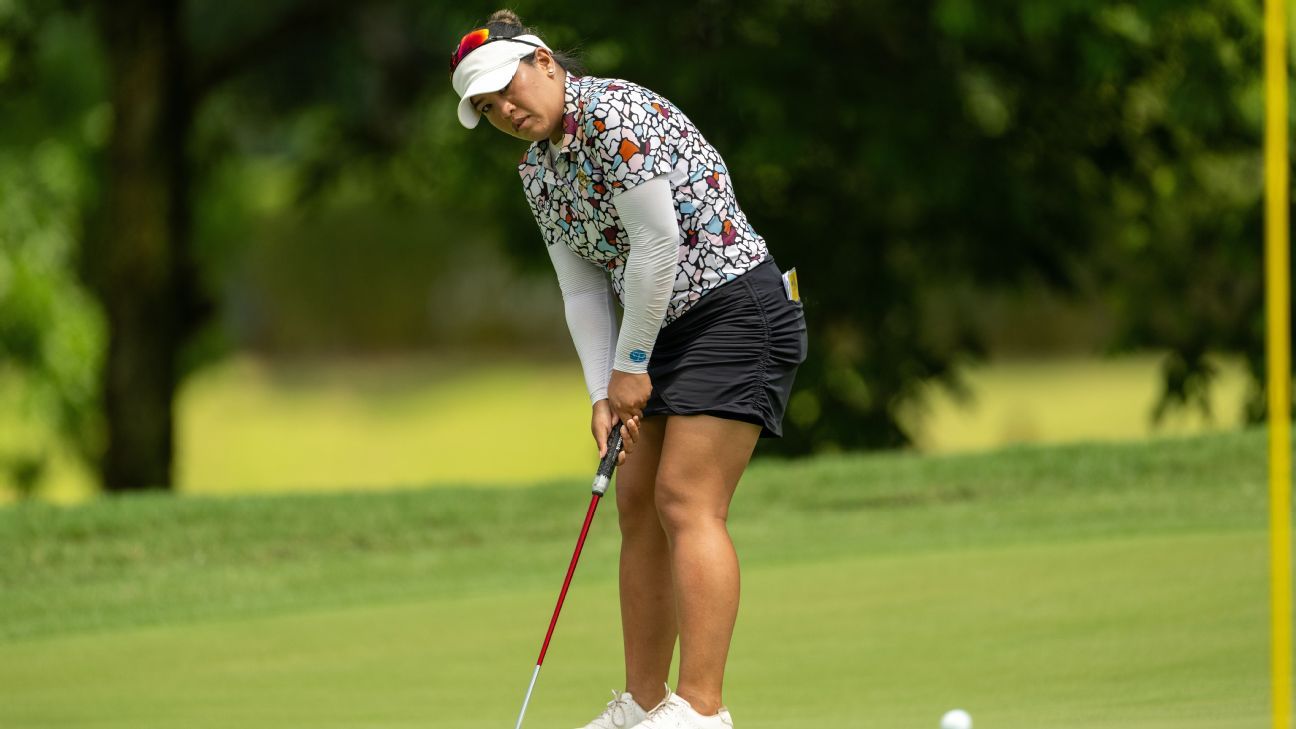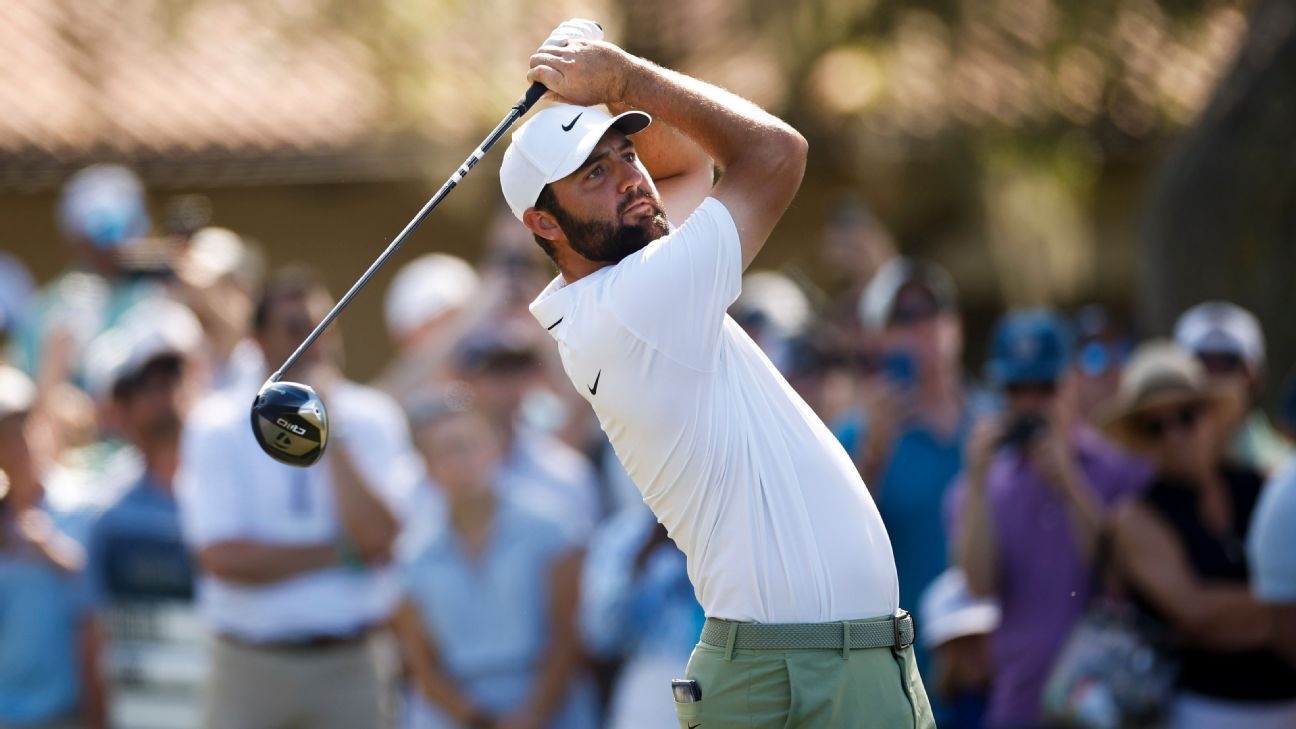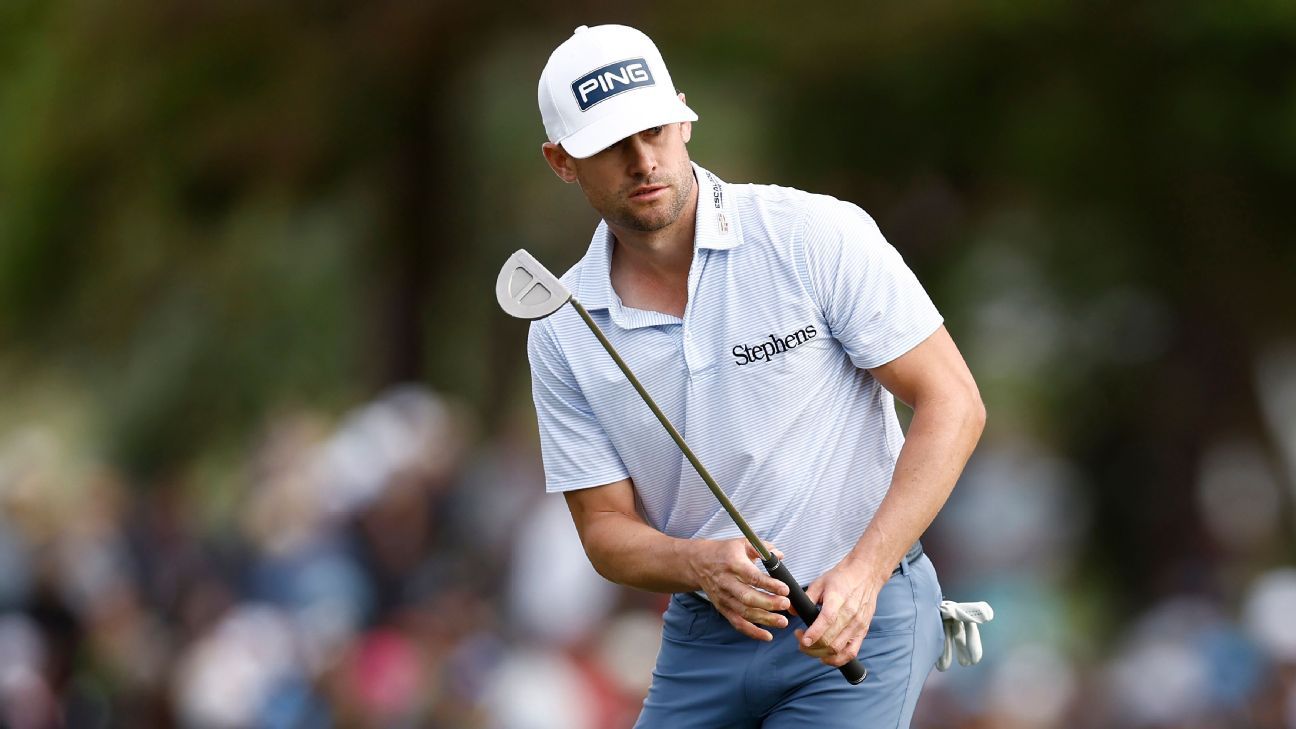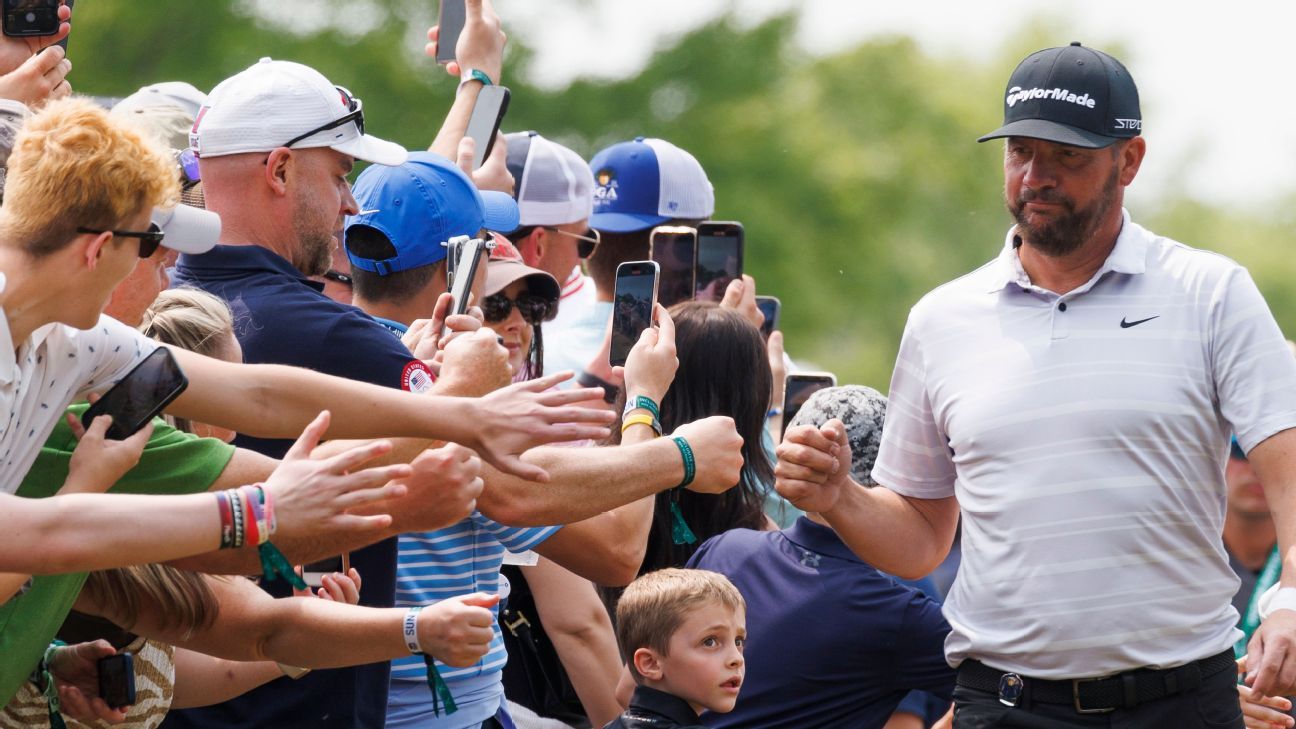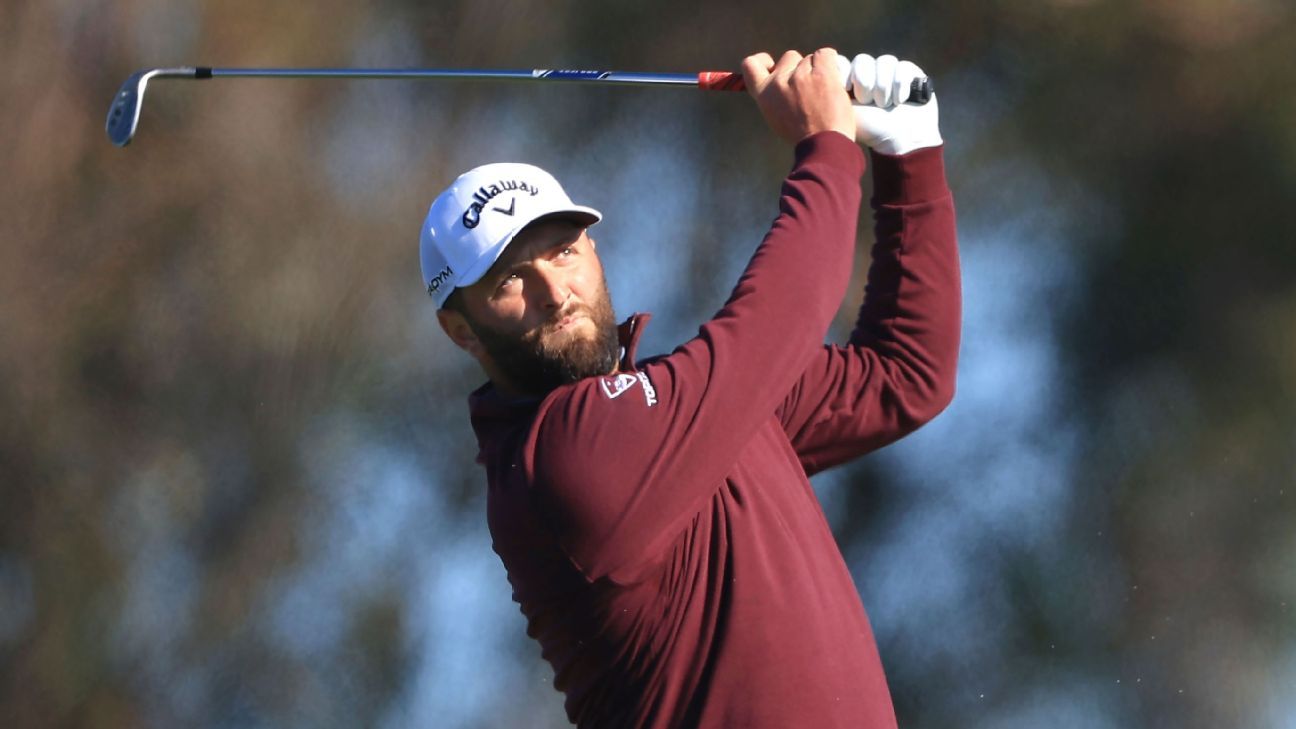Wyndham Clark’s U.S. Open win was bigger than a golf victory
PINEHURST, N.C. — As Wyndham Clark began the walk down the No. 1 fairway in the final round of the 2023 U.S. Open at Los Angeles Country Club, many fans cheered for Rickie Fowler, who was playing in the final pairing with him.
“Remember they’re cheering for him,” Clark’s caddie, John Ellis, told him. “Remember who they’ll cheer for at the end.”
Ellis’ advice proved prophetic, as Clark held off Fowler, world No. 1 golfer Scottie Scheffler and four-time major championship winner Rory McIlroy for a 1-shot victory to win his first major.
It was a far cry from the conversation Ellis had with Clark eight months earlier in the final round of the CJ Cup at Congaree Golf Club in Ridgeland, South Carolina. Clark was on his way to tying for 29th at 5 under, 12 shots behind winner McIlroy.
Walking up the fairway of the 18th hole, Clark had only 11 clubs in his bag — instead of the allowable 14. He had broken his putter in anger for the second day in a row and given it to a fan, snapped a sand wedge after a poor chip shot and damaged his 3-wood when he slammed it against his driver.
“It made my bag quite light,” Ellis said.
After the round, Ellis delivered what was all but an ultimatum to Clark: “You’re on the verge of being one of the best players in the world, and you’re also really, really close to being on the verge of being off the tour. You can’t go about it like this.”
THIS WEEK, CLARK arrives at Pinehurst No. 2 as the defending U.S. Open champion and one of the best golfers in the world. It is the culmination of a comeback from personal tragedy and years of battling anger and self-doubt in his talent.
Clark is one of several golfers on the PGA Tour who has been open about struggles with mental health, along with North Carolina native Grayson Murray, who died by suicide in May — a day after withdrawing from the Charles Schwab Challenge at Colonial.
“At the end of the day, you know, golf is golf and, yeah, we play it for a living, but it pales in comparison to the things that actually matter in life,” McIlroy told reporters at the RBC Canadian Open in the wake of Murray’s death. “I’ve had to realize that at times and I’m still sort of working my way through that in terms of not making golf the be-all end-all for me.”
It took a village to help Clark realize that how he plays has no bearing on his self-worth.
“He’s not even the same human — on and off the course,” Ellis said. “I think he judged himself for who he was based on how he played those 18 holes of golf in a day. That’s a tough way to live life, right? If you look around, he’s on the PGA Tour, he’s making a significant amount of money, he’s playing a sport he loves. It’s pretty good what you’re doing, regardless of how things are going.”
Ellis was an assistant coach at the University of Oregon in Clark’s lone season with the Ducks in 2016-17. The two hit it off, so Ellis followed him to carry his bag on the Korn Ferry Tour and then the PGA Tour. Ellis didn’t want to leave Clark without a caddie, but he knew the player’s behavior wasn’t good for their relationship — or his golf.
“There was a point where there’s nothing I’m doing or saying that’s getting through to him,” Ellis said. “It wasn’t working based on how he was handling himself.”
Ellis encouraged Clark to contact performance coach Julie Elion, the founder of the Center for Athletic Performance Enhancement, who had helped PGA Tour golfers Phil Mickelson, Max Homa, Justin Thomas and others.
AT FIRST, CLARK wasn’t keen on the idea of working with Elion. He had worked with sports psychologists throughout his career and sought therapists’ help following his mother Lise’s death from breast cancer in 2013. He didn’t believe any of them had helped.
“I tried them all,” Clark told Ellis.
“Well, this person could be different,” Ellis said.
When Clark’s manager Rob Mougey also encouraged him to contact Elion, he finally relented.
“I ultimately agreed because I was at a point in the fall of 2022 where I was playing good golf, but I wasn’t scoring good, and then I wasn’t happy,” Clark said. “I was really frustrated. I was kind of at the point where I was like, ‘I don’t want to do this anymore.'”
The first time Elion, who spoke to ESPN with Clark’s consent, talked to Clark on the phone in late 2022, she was taken aback by his reluctance to work with her.
“He wouldn’t want me to say this, but he was even a little, like, rude,” Elion said. “And, you know, I’ve seen that before. I’m at a point in my career that it really didn’t matter to me either because somebody has to want to do it. I never make the phone call, right? They have to say, ‘I want to get better.’ When I first talked to him, I wasn’t sure if he was there.”
Elion’s assessment of Clark’s willingness to peel back the mental obstacles that were preventing him from becoming one of the best golfers in the world didn’t change much after their initial face-to-face meeting at an Arizona Starbucks in January 2023.
“The first meeting was me telling her how I’m very skeptical of the work she does,” Clark said. “Pretty much me telling her that I’ve seen a lot of sports psychologists, have worked with a lot of mental coaches, if you will. I said, ‘I don’t know if you’re going to be that much different.'”
Clark and Elion came to an agreement: He would do what she asked of him for six months, and if there were no improvements in his life — on and off the course — they’d go their separate ways.
She was willing to put in the work because some of her other clients had said Clark was as talented as anyone — if he could tackle the mental part of the game.
Elion told Clark that since he was at rock bottom mentally, there was only one way to go — up.
“The word on the street was that this guy is unbelievable,” Elion said. “But it was a mountain to climb, so I kept trying to remind myself of that. I was like, ‘Do I really want to take this on?’ But it seemed like he had a very sweet, kind, thoughtful part of him underneath it all.”
An All-American at Oklahoma State and Oregon, Clark’s professional career had gotten off to a promising start. In 2019, he was one of eight PGA Tour rookies to make the FedEx Cup playoffs after piling up three top-10s and eight top-25s. Then things went south. The next season, he missed 12 cuts in 23 starts. During the first round of the 2020 Rocket Mortgage Classic in Detroit, he walked off the course after carding three bogeys in four holes and withdrew. At the end of 2021, he didn’t make the weekend in each of his past seven starts.
“I think maybe his expectations and what he perceived of himself and what was reality were different,” Ellis said. “He came out thinking he was the best player in the world, which is great. I don’t want to say his expectations were too high because to be great, they have to be high. But he had a little success, and then he expected to win every golf tournament, and it just doesn’t work like that.”
AT THE BEGINNING of 2022, Clark was ranked 252nd in the world.
“I had trained my mind over years of belittling myself and thinking negatively, locking myself in rooms and not coming out for a long time, or drinking to excess, or being mean to people,” Clark said during an episode of the second season of “Full Swing” on Netflix. “I didn’t want to play golf.”
Clark’s underlying anger is what Elion focused on during their first few sessions. She talks to her clients multiple times each week and attends several tournaments, including all four majors. She’ll talk to clients about non-golf issues early in the week, then help them set goals for each round and dissect them during tournaments.
Elion said Clark was dealing with “loss and grief and anger because he wasn’t where he thought he should be in his career.”
Clark said much of his anger and pain came from his mother’s death. Lise Clark introduced her son to golf when he was 3 years old. She later passed the baton to Clark’s father, Randall, who picked up the game when his son showed interest.
Randall Clark was a star tennis player growing up in Albuquerque, New Mexico. He is one of only two four-time individual state champions in New Mexico high school history. He was a No. 1 singles player at the University of Arizona, but his promising professional career was derailed by injuries.
Lise was crowned Miss New Mexico and competed in the Miss USA pageant in 1981. They were married at Riviera Country Club outside Los Angeles in 1989. Six months after their younger son, Brendan, was born in June 1997, Lise was diagnosed with breast cancer. She endured chemotherapy and radiation and was declared cancer-free in 2001.
In 2012, Clark enrolled at Oklahoma State and was considered one of the top amateurs in the country. Then, four days before Christmas in 2012, Clark’s mother was diagnosed with stage 4 metastatic breast cancer. The disease had spread throughout her body. Doctors told her that radiation, chemotherapy and surgery were not an option.
Lise died Aug. 2, 2013. She was 55. She loved to tell her son, “I love you, winner.” Shortly before her death, Lise had one last message for him: “Hey, play big. Play for something bigger than yourself.”
Although Clark was named an All-American by Golfweek and voted Big 12 Player of the Year the next season, the weight of his mother’s absence soon began to take a toll on his life and game. After struggling much of the next two years, he transferred to Oregon for his final college season.
AFTER WINNING THE U.S. Open, Clark described his mother as his “rock” and “always-there supporter.”
“So when things were tough or when things were going great, she was always there to keep me grounded and either bring me up or keep the high going,” Clark said.
Through his time with Elion, Clark learned that his mother was more than that. Sometimes, she was also a filter between him and his father.
“My dad was a professional tennis player,” Clark said. “Dads unknowingly put a lot of pressure on their kids sometimes, especially when they excelled at something. And so I felt a lot of pressure from my dad as well. And so I think the combination of those two, it just made it tough to where, you know, I felt a lot of pressure from my dad. And then I didn’t have my mom to go to after she passed, and so it was tough to deal with things.”
Randall described himself as a “highly competitive professional athlete” and later a “hyper competitive hot shot on Wall Street” on his LinkedIn account. He declined to be interviewed.
Randall wasn’t at Los Angeles Country Club when his son captured the biggest victory of his career at the 2023 U.S. Open. Clark said his dad “couldn’t make it” and “didn’t want to jinx anything.”
“I love my dad, and he obviously loves me,” Clark said. “But it was tough for me at tournaments sometimes having him there. Now, he’s coming to tournaments, and I feel like our relationship is growing a ton, which is what I want. I want my dad to be there and embrace him after a win. I want to be able to enjoy our time together, which we do now and it’s really nice.”
Elion said Clark’s relationship with his father has improved dramatically.
“I think the mom was supportive and the glue and probably was very encouraging to Wyndham,” Elion said. “I think the relationship was a little different with his dad. Now, it’s actually come full circle where he’s starting to feel that with his dad, which is great.”
At Oregon, Clark found a second family in Jeff and Jamie Gaskill and their three young daughters. The Gaskills had first met Clark when he was 15 years old. They hosted him while he competed in an amateur tournament in Eugene. Clark stayed with them again when he made a recruiting visit to Oregon before signing with Oklahoma State.
When Clark decided to transfer to Oregon for his final college season, the plan was for him to stay with the Gaskills for about a week until he met his new teammates and found a roommate. He ended up living with them for his entire school year.
“When he got here, I think he realized he needed more family stuff,” Jeff said. “I think that was one of the missing pieces. His mom was the homemaker and she provided that kind of comfort for him. When she went away, his sister was older, and his brother was the only one living in Denver with his dad. He was kind of on his own for a while. He felt stranded.”
Gaskill’s two older daughters, Kaitlyn and Kaleah, who were 6 and 9 at the time, relished Clark’s presence. They painted his fingernails and did his hair. When he returned home from a tournament, there was a banner congratulating him on his performance, whether he finished first or 23rd.
When the Gaskills went to Hawaii for Christmas in 2016, Clark returned to Denver to be with his family. After the holidays, Kaleah told a teacher that she missed her brother during the break. The teacher asked Jamie if her husband had a son from a previous relationship — not realizing that Kaleah was talking about the Oregon golfer who was living with them.
Clark still visits the Gaskills during holidays, and they attend a handful of his tournaments each year.
“I really think that was instrumental when you really look at it because he had a ton of support,” Oregon golf coach Casey Martin said. “He had this neat family that just embraced him. That really allowed him to slow down and kind of get out of the rat race. Whether it was a social rat race or whether it was a golfing rat race, I think life slowed down that way.”
CLARK’S FORM RETURNED at Oregon as well. When he arrived in Eugene, Martin said his game was in a “bad place.”
“He was just kind of scrambling in a semi-angry mode of, ‘Why can’t I figure this out?'” Martin said. “It wasn’t so much a golf issue as it was just putting the ducks in a row. Just getting his life kind of balanced and just getting a clear head. That happened here at Oregon because I kind of knew that needed to happen because it was obvious that it wasn’t a talent issue or a skill issue.”
With Ellis shadowing Clark on the course, and the Gaskills supporting him off it, he became one of the best players in the sport again. He won the Pac-12 individual championship and was named the league’s player of the year in 2017. He was a finalist for the Ben Hogan Award as the top player in college golf.
“It was still a battle to get him to not be a perfectionist and just not kind of be overly critical of his golf and mechanics,” Martin said. “I think now he’s in a place where he’s just kind of doing it with him and John. I think that’s pretty powerful when a player takes ownership, learns it and just focuses on simplicity, if that makes sense.”
Four months after Clark started working with Elion, he captured his first PGA Tour victory with a 4-shot win at the Wells Fargo Championship at Quail Hollow in Charlotte in May 2023. The next month, he won the U.S. Open. He finished third at the season-ending Tour Championship and competed on the U.S. team at the Ryder Cup in Rome.
This season, Clark picked up his third victory at the AT&T Pebble Beach Pro-Am on Feb. 4 and was runner-up to Scheffler in back-to-back starts at the Arnold Palmer Invitational and Players Championship in March. He missed the cut at his first Masters and the PGA Championship, but is looking to regain momentum at Pinehurst No. 2.
The golfer who couldn’t figure out how to win is now ranked No. 4 in the world.
“I was imagining I could be kind of in the spot I am at now,” Clark said. ” At least if I looked internally and looked at my talent and work ethic and the things that I knew I could do with a golf ball and what I did in practice. But if I looked at what I did in competition under the lights, two, three, four years ago, I maybe wouldn’t have believed it.
“Because I always struggled to bring out the most in my game when it mattered. And after meeting with Julie, you know, over about a year and a half ago, and, you know, she was so confident that I could do everything that I’ve done thus far. And to now look — and she was right — is pretty amazing.”
If you or someone you know is having thoughts of suicide or is in emotional distress, contact the National Suicide Prevention Lifeline at 1-800-273-TALK(8255) or at suicidepreventionlifeline.org.
Check out our Latest News and Follow us at Facebook
Original Source


